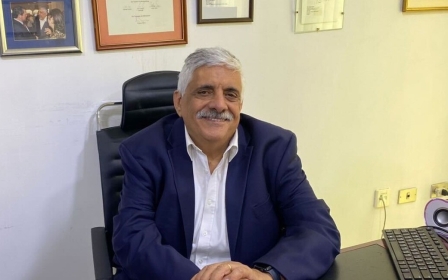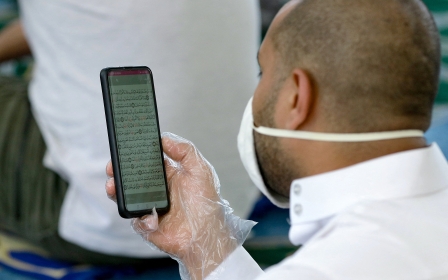Jordan sedition plot: What next after Prince Hamzah's apology to the king?
An apology letter sent by Jordan's Prince Hamzah to King Abdullah II has raised several questions about its implications and prompted calls for political reform in the kingdom.
Jordan said on Tuesday that King Abdullah received a letter of apology from Prince Hamzah, who was accused last year of conspiring to destabilise the country.
In the letter released by the official Jordan News Agency, the king's half-brother, Prince Hamzah, wrote that he made "a mistake" and that he took responsibility for the "abuses I have taken against [the king] and our country".
'The issue is much deeper than the claim of an end to a family dispute'
- Jamal Jeet, Unified Jordanian Hirak movement
"Last year, our dear Jordan passed through a difficult circumstance and an unfortunate chapter," wrote Prince Hamzah, who was crown prince until 2004.
"The months that have passed since that time have provided me with an opportunity for self-reflection, and frankness with myself… I made a mistake."
New MEE newsletter: Jerusalem Dispatch
Sign up to get the latest insights and analysis on Israel-Palestine, alongside Turkey Unpacked and other MEE newsletters
The palace drama erupted last April when Prince Hamzah, a former heir to the throne, was detained at home in Amman after being accused of fomenting unrest in the kingdom.
Jordanian authorities arrested at least 16 people in relation to the alleged plot which sought to replace King Abdullah with the prince.
The incident exposed deep rifts within the royal family and rocked the kingdom's image as a bastion of stability and security in a volatile region.
Since Tuesday's letter, Jordanian activists and commentators have been left wondering what would happen after the supposed end to the feud between the two royals.
Jamal Jeet, a spokesman for the pro-reform Unified Jordanian Hirak movement, said the letter did not resolve the root cause of the sedition trial, and questioned what this meant for both Bassem Awadallah, a former royal court chief, and Sharif Hassan bin Zeid, a low-ranking royal, who were sentenced to hard labour over their alleged involvement in the conspiracy.
"Has the sedition issue been closed now? What about the roots of the problems and the reasons that caused the prince to do what he has done?" Jeet told Middle East Eye.
"Didn't the prince say that there is bad management of the country and many important sectors are experiencing a setback?
"The issue is much deeper than the claim of an end to a family dispute."
Months after the case ended, Prince Hamzah has not been seen in public, and last November Queen Noor said that her son was still not free, which seemed to indicate the spat between the royal brothers was still festering.
Calls for new pardon law
On 11 July, King Abdullah decided to create a commission to modernise the country's political processes and tasked former prime minister Samir al-Rifai to head it, along with 92 members representing all colours of political life.
The commission submitted recommendations on electoral laws as well as corresponding constitutional amendments, but the opposition dismissed the proposals as insufficient.
A Jordanian official who spoke on condition of anonymity told MEE that Prince Hamzah's letter was not linked to the case of Awadallah and bin Zeid and that there would be no pardon for them in the foreseeable future.
"Maybe in the future and as part of a general or private pardon, they might be included along with the former member of parliament Osama Ajarmeh. But all this has nothing to do with the letter that ended the differences between the brothers.”
The secretary-general of the Popular Unity Party, Said Thiab, said that the letter should open the way to resolving issues connected to the sedition case.
"There is a need for a new page in which those in power deal with people like the Hirak protesters in a different way, rather than taking them to court handcuffed," Thiab told MEE.
"We need a pardon that includes all political prisoners and a political opening that includes a serious effort towards political reform and the respect of rights."
'A mere charade'
Following Tuesday's letter, Prince Hamzah has been a trending hashtag in Jordan, with users commenting on his loyalty to the king.
"Unfortunately, they are belittling the minds of the wide awake Jordanian people... The people want visual proof so that they can trust that this is a credible apology by the prince, otherwise the people think that this is a mere charade," tweeted one user.
Another wrote that the apology was "a private matter" and "the family should decide whether this was the right thing to do or not. They are also the ones who have paid the price.'
'By accepting the apology, the king has signalled the beginning of a new era in which the prince will be back serving the homeland'
- Mahmoud al-Kharabsheh, former minister
Using chat rooms on the social media site Clubhouse, several Jordanians called on authorities to extend clemency on political prisoners that had been detained in recent months. They also called on the king to enact political reforms in which political power is brought back to the people by means of an elected government.
However, Senator Mohammad Momani, a member of the upper house of parliament, appeared to rebuff the requests, stating the sedition trial was a "separate issue that has its own legal process".
Likewise, former minister of state Mahmoud al-Kharabsheh said Prince Hamzah's case was "separate from the others who have received final conviction by the courts".
"The only possible scenario now is a new law that allows for a general or specific pardon,” he told MEE. "The letter is a positive initiative from the prince and reflects goodwill on his part by expressing remorse for acting outside the laws and traditions of the Hashemite family.
"It shows that the Hashemites are able to correct the path and close the case. By accepting the apology, the king has signalled the beginning of a new era in which the prince will be back serving the homeland.”
Former minister of media affairs, Samih al-Maaytah, said the letter was a "political statement that includes an apology to both the king, Jordanians, and the Hashemite family regarding what he expressed in past years."
Middle East Eye delivers independent and unrivalled coverage and analysis of the Middle East, North Africa and beyond. To learn more about republishing this content and the associated fees, please fill out this form. More about MEE can be found here.





